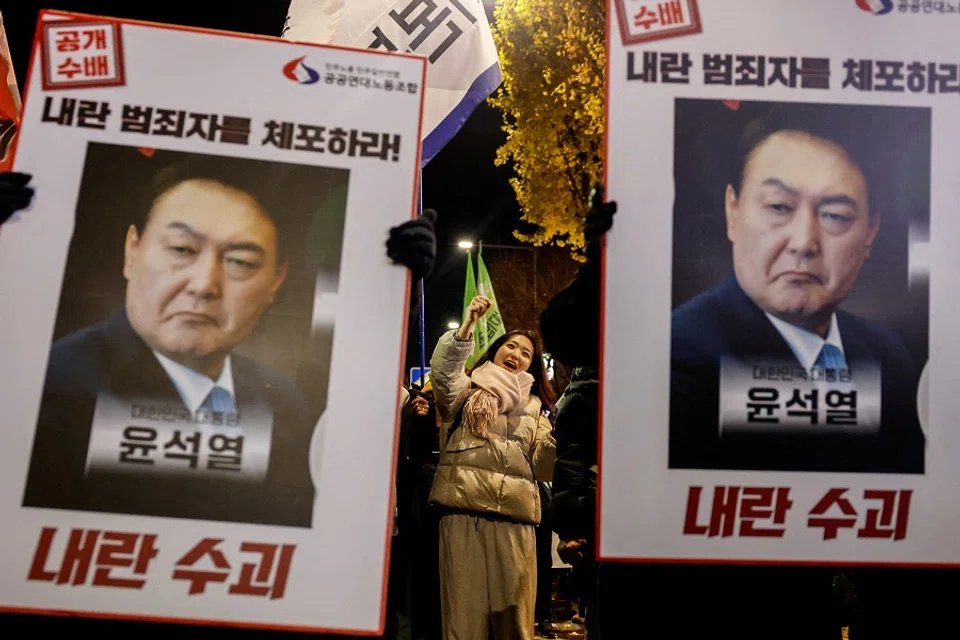South Korea’s emergency martial law turmoil and geopolitical ripples across East Asia
As South Korea continues to be mired in political crisis following President Yoon Suk-yeol’s declaration and withdrawal of emergency martial law, academic Hao Nan analyses the impact on South Korea’s neighbours and partners. He thinks that for China, the opportunity to exploit divisions among US allies will be too significant to ignore.

South Korea is once again in the global spotlight, not for its technological advancements or cultural exports, but for political instability that many believed was a relic of its past.
On 3 December 2024, President Yoon Suk-yeol declared emergency martial law — the first such move in 44 years — only for the decision to be overturned within hours by the National Assembly. While South Korea has weathered political storms before, this event marks a concerning new chapter, revealing cracks in domestic governance and leaving room for significant regional and global consequences, particularly for China and geopolitics in East Asia.
President Yoon justified his decision under Article 77 of the South Korean constitution, citing the need to restore “national normalcy” and accusing opposition parties of undermining the state.
In particular, Yoon attempted to recall the Cold-War scenario by labelling the liberal-left opposition as pro-communist and pro-North Korea forces against South Korea’s liberal democracy, but this appeal did not resonate with the general public as it did in the previous two coups in 1961 and 1979, and did not receive US support either.

Instead, his move was met with near-universal condemnation. Within hours, 190 lawmakers from both ruling and opposition parties nullified the martial law declaration, forcing Yoon to retract it by early morning on 4 December. The fallout has been swift and severe: mass protests, plummeting approval ratings and calls for impeachment. But while the domestic consequences are stark, the geopolitical implications — particularly in relation to China — deserve closer scrutiny.
... if the impeachment motion passes, Yoon will step down, leading to months of uncertainty before a new presidential election.
South Korea’s political stability in question
President Yoon’s declaration of martial law is not merely a domestic crisis; it signals a broader weakening of South Korea’s governance at a critical time. Historically, such declarations in South Korea have led to military coups, as seen in 1961 and 1979, but this time, the swift pushback from lawmakers and the public underscored the country’s commitment to its hard-earned civilian governance.
Nevertheless, the damage to South Korea’s political stability is already done, with impeachment proceedings imminent and a fractured government unable to focus on pressing issues.
Yoon is less likely to step down voluntarily, as losing presidential immunity would almost certainly expose him to prosecution by the opposition-dominated legislature. Furthermore, since Yoon’s ruling People Power Party has remained reluctant to join the six opposition parties to fulfill the constitutionally-required two-thirds majority for passing the impeachment motion in the National Assembly, two dominant scenarios are ahead.
If the impeachment motion against President Yoon does not pass, he will remain in office but face relentless opposition from lawmakers, labour unions and civil society, leaving his administration paralysed and unable to govern effectively. This would likely result in prolonged political instability, further damaging South Korea’s economy and public trust in leadership.

On the other hand, if the impeachment motion passes, Yoon will step down, leading to months of uncertainty before a new presidential election. In this scenario, opposition leader Lee Jae-myung is highly likely to win the presidency, bringing a shift towards populist economic policies and recalibrated foreign relations.
Opportunity for South Korea’s neighbours and partners to reshape the regional order
In either scenario, the political paralysis would hinder South Korea’s economic resilience and policy effectiveness, weakening its ability to navigate an already challenging regional environment. Domestically, the Korean won has plunged, stock markets have wavered, and labour unions have called for indefinite strikes. Yet the repercussions will not stop at South Korea’s borders. For its neighbours and partners — China, Japan, the US, Russia and North Korea — this moment of instability offers both challenges and opportunities to reshape the regional order.
If Yoon leaves the scene and South Korea’s opposition Democratic Party, led by Lee Jae-myung, takes the reins of power, a more conciliatory approach towards China is likely.
China
Among the regional players, China stands to benefit the most from South Korea’s turmoil. Under President Yoon, South Korea took a decisive turn towards the US, forging closer trilateral ties with Tokyo and Washington. This alignment, which included supporting NATO’s stance on Ukraine, aligning with Indo-Pacific strategies to contain China, expanding US nuclear deterrence on the Korean peninsula, shifting the special inter-Korea relations in pursuit of national reunification to hostile inter-state relations, deeply strained Seoul-Beijing relations. Yoon’s potential impeachment or resignation, however, may pave the way for a recalibration of South Korea’s foreign policy — a shift Beijing would welcome.
If Yoon leaves the scene and South Korea’s opposition Democratic Party, led by Lee Jae-myung, takes the reins of power, a more conciliatory approach towards China is likely. Historically, South Korea’s liberal administrations have sought to balance their US alliance with cooperative relations with China, recognising Beijing’s critical role as a trading partner and regional powerbroker. Lee has signalled a preference for de-escalating tensions with China and North Korea, which aligns with Beijing’s interest in reducing US influence in the region.
North Korea, too, will see an opportunity in South Korea’s crisis but is unlikely to escalate military tensions.
A weakened or distracted South Korea also reduces its ability to participate in broader US-led initiatives to counter China’s rising influence. For instance, Yoon’s government had been a vocal supporter of US policies in the Indo-Pacific, including semiconductor alliances to curb China’s technological advancements and discussions on arms exports to Ukraine. Political instability in Seoul undermines these efforts, giving China more breathing room to consolidate its regional influence.
North Korea
North Korea, too, will see an opportunity in South Korea’s crisis but is unlikely to escalate military tensions. Pyongyang has long used provocations to exploit South Korea’s domestic divisions, but its recent constitutional abandonment of reunification goals suggests a strategic pivot. Rather than risking open conflict, North Korea will likely aim to bolster its regime security while waiting for more favourable conditions under a potential Democratic administration in Seoul.
Russia
Russia, like China, is well-positioned to benefit from the disruption. Under Yoon, South Korea had been a rare Asian ally signalling potential to supply military aid to Ukraine. Political instability may delay or derail such commitments, relieving pressure on Moscow. Furthermore, South Korea’s weakened alignment with the US-Japan alignment could disrupt efforts to counter Russian influence in the Indo-Pacific, particularly in areas like arms sales and energy security.
Japan may find itself increasingly isolated as South Korea’s focus shifts inward, leaving critical regional initiatives stalled.
US and Japan
For the US and Japan, South Korea’s instability is a major setback. The Yoon administration’s rapprochement with Tokyo had been a cornerstone of regional security cooperation, particularly in countering North Korea and balancing China. However, this progress is now at risk. With Japanese Prime Minister Shigeru Ishiba grappling with his own political challenges in losing the parliamentary majority and President-elect Donald Trump preparing to return to the White House, the trilateral alliance faces an uncertain future.
Trump’s isolationist tendencies and transactional approach to alliances will likely exacerbate the situation. South Korea’s political paralysis weakens its bargaining position in defense cost-sharing negotiations with Washington and undermines its leverage in shaping Indo-Pacific strategies. Meanwhile, Japan may find itself increasingly isolated as South Korea’s focus shifts inward, leaving critical regional initiatives stalled.
For China, the opportunity to exploit divisions among US allies is too significant to ignore. Beijing will likely intensify its economic and diplomatic outreach to South Korea, offering incentives to mend ties and isolate Seoul from Washington.
East Asia instability could reverberate across borders
Beyond the immediate fallout, South Korea’s crisis highlights deeper trends reshaping East Asia’s geopolitical landscape. The region is entering a period of heightened uncertainty, where domestic instability in one country reverberates across borders. For South Korea, the stakes are existential. Failure to restore domestic stability will not only erode its global standing but also leave it vulnerable to external pressures from China, North Korea, and other regional powers.
For China, the opportunity to exploit divisions among US allies is too significant to ignore. Beijing will likely intensify its economic and diplomatic outreach to South Korea, offering incentives to mend ties and isolate Seoul from Washington. Such moves could realign the regional order in China’s favour, particularly as the US grapples with its own leadership transition.

South Korea’s current crisis is a stark reminder of the fragility of political systems, even in countries with strong democratic institutions. While the immediate focus is on President Yoon’s fate, the broader implications for East Asia cannot be overlooked. China, North Korea and Russia are already positioning themselves to exploit the vacuum left by a distracted South Korea, while the US and Japan face new challenges in maintaining regional alliances.
As South Korea navigates this turbulent period, its leaders must recognise the far-reaching consequences of their domestic decisions. Political stability is not just a prerequisite for governance—it is a cornerstone of South Korea’s role as a regional power. For its neighbours and allies, this moment is a sobering reminder that the geopolitics in East Asia remains as dynamic as ever.





